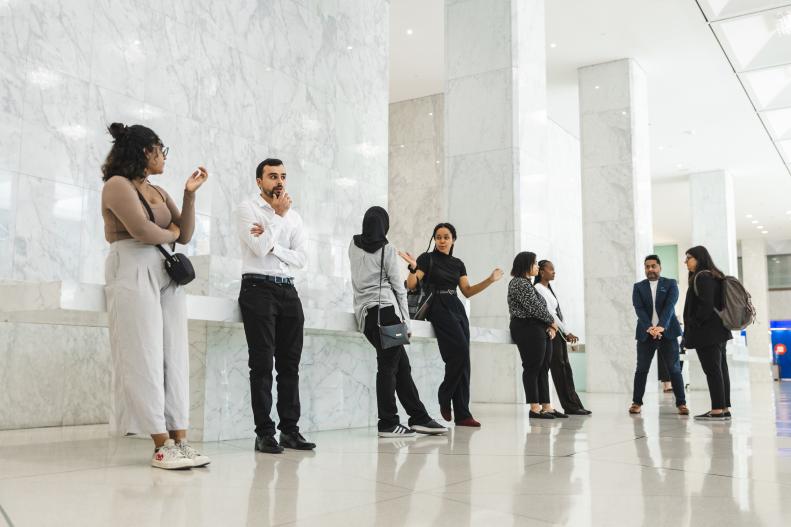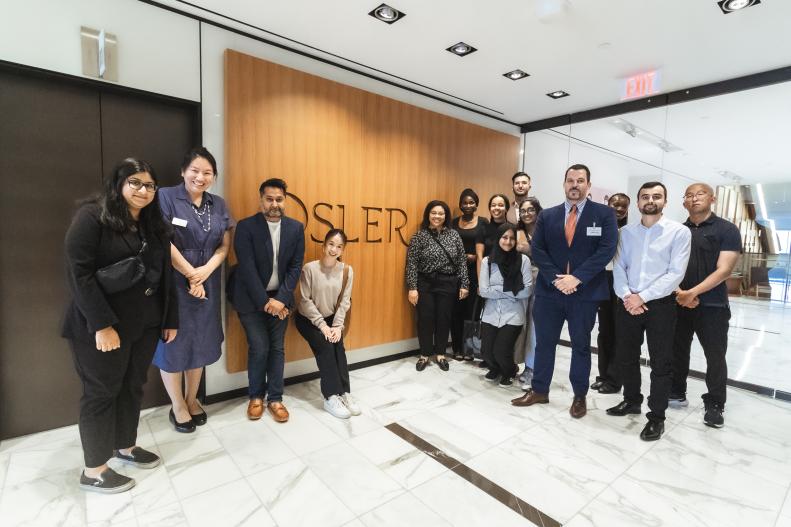Law school is notoriously expensive, but the steep costs can start well before a student even applies. That may leave those without ample funds at a disadvantage.
It’s common for aspiring law students to take prep courses to get ready for the LSAT (the test needed to get into law school). These courses can give them a serious edge — and cost thousands of dollars. A new free program at U of T Scarborough is helping students on financial aid prepare not just for their LSATs, but for everything that comes after.
“It’s a very realistic program that really built on how to practically help students,” says Amrith David (HBA 2023 UTSC), who is president of the Scarborough Campus Students’ Union (SCSU) and supported the program’s creation. “It’s tailored toward your needs and provided to such a diverse community.”

Several members of the first cohort, David included, are getting acceptances from top law schools after completing U of T Scarborough’s Law School Prep Program (LSPP). It was launched primarily to help level the playing field for students who rely on financial aid, such as OSAP.
David has noticed most lawyers in Ontario don’t look like him — in fact, about three-quarters of them are white — and he says that’s why it was important that the LSPP also encouraged racialized students to apply.
“I know students whose families have been denied legal aid because of where they come from, and I know students who want to work with their own communities, who want to provide for racialized people from immigrant families,” says David. “That's a big step forward because you don't see much of that around the big law firms.”

Twice per week for 11 weeks, students attended classes led by two second-year law students, who helped them build the skills and speed needed to complete the LSAT. Test-takers have 35 minutes to finish each of the LSAT’s three sections, and David says before the program, it was taking him 75 minutes to complete just one section — afterward, his LSAT score landed him in the top 93rd percentile of applicants. He’ll be attending Osgoode Hall Law School this fall.
The LSPP's cohort of 20 got on-the-ground insights into the rigorous process of applying to law school, including how to stand out in applications, the online platforms used and what different schools look for when choosing students. The LSAT is only part of what they need to apply, and the cohort had personalized coaching in putting together the other elements, such as personal statements (another service that’s often prohibitively expensive).
Embedded throughout the LSPP was advice on affording the high costs of law school, from applying for fee waivers to the different resources and supports students might be able to access, along with their many associated deadlines.

The program was launched by Neel Joshi, dean of the Office of Student Experience and Wellbeing, who previously worked at U of T's Faculty of Law as its admissions director. Joshi recognized the need for a program specifically hosted at the Scarborough campus, and set out to raise the number of applicants coming from the east end.
“The hope is that by having this program take place in Scarborough, the legal sector in Ontario will have more lawyers with lived experience from our region,” says Joshi, who brought together staff at the U of T Faculty of Law, the Academic Advising and Career Centre, departmental chairs and the SCSU to bring the program to life.
The LSPP included what it called “essential learning components” that had students on a trip to Osler, one of the major law firms on Bay Street in downtown Toronto. Students had rotating one-on-one conversations with the firm’s partners over lunch, then heard about lawyers’ personal journeys in a discussion session. Their talks also explored alternate career paths they could pursue at Osler, such as legal research.

Other components encouraged students to get a feel for what kind of lawyer they want to become. They heard from a range of guest speakers about their experiences in law school, what working in the field is like and the different fields of law. They also toured U of T’s Faculty of Law, one of the top law schools in the world and where Justus Chan (HBA 2024 UTSC) will attend this fall.
Chan says a question-and-answer period with law students stuck out to him, and he found it especially helpful “to meet and talk with current law students and lawyers and learn from their experiences, which may not be accessible to some students or would be much more difficult to organize outside of the program.”
